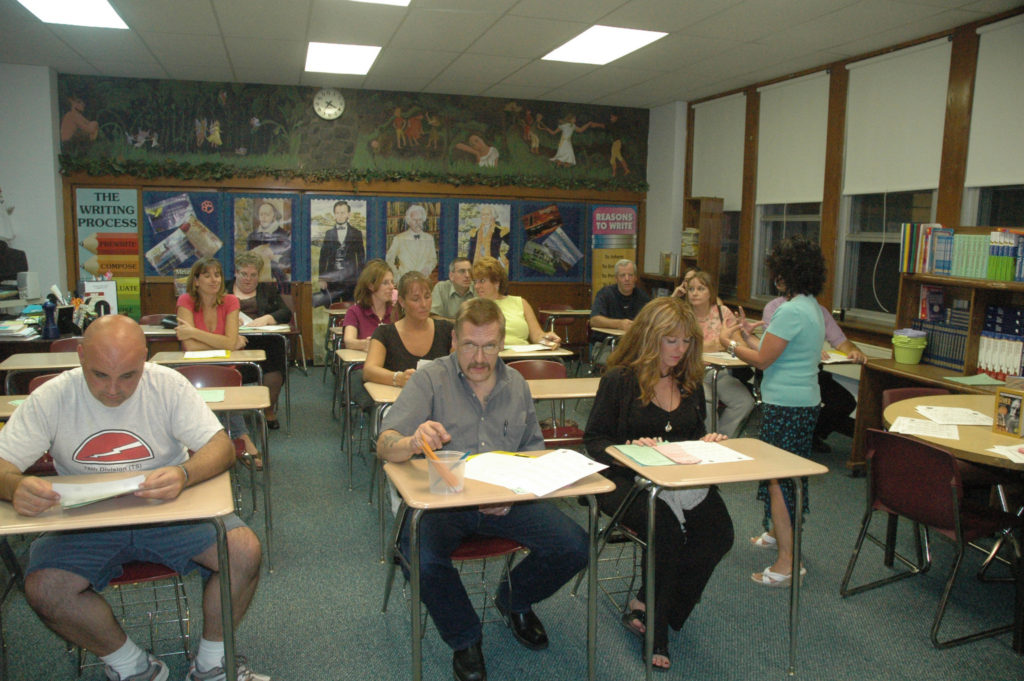Are You Missing Out On This Opportunity?

Middle school and high school offer several ways to find out more about the classroom and what’s expected. The two most common ways are the Meet the Teacher nights and the Parent-Teacher Conferences. As your kids get older, they work more independently, so you may not think these are important, but because they work more independently, finding out what’s happening is even more important, especially for visual and ADD students.
Meet the Teacher Nights
Meet the Teacher Night, always my favorite, was held at the beginning of the school year but was sorely under-attended. I always found these evenings to be hugely beneficial and felt the effect throughout the school year. I was also always really surprised at how few parents took advantage of the opportunity. Only 1/2 to 1/3 of the students were represented by a parent. By high school, while I always attended, I noticed that it was down to only 4 or 5 parents per classroom. What a missed opportunity to really understand what their child’s school day looks like.
Meet the Teacher nights are usually held in the evening in early fall. Parents go to the school to spend 5-10 minutes in each classroom following their child’s schedule. It gives parents a chance to meet the teachers and get a sense of what’s expected in each class. Things like the tone or mood of the classroom and how many kids are in each class as well as how the subject matter is presented and utilized. For me, meeting the teachers and getting a sense of their teaching style and classroom expectations were key to a successful year. Imagine high school English class with a dry professor type, that thinks every child wants to read, analyze and write papers more than anything else, verses a more contemporary teacher that differentiates instruction, breathes life into what kids are reading and thinks there are multiple ways to show what you’ve learned. Knowing who your child’s teacher is, is a good indicator of how miserable or exited your student is going to be in English class this year, as well as what kind of home support will be needed.
Attending Teacher Nights gives you a general understanding of how many kids are in the classroom, what curriculum they’re using, homework expectations and so much more. You can even get sense of how reasonable, inspiring or harsh a teacher might be, which is helpful when or if your child starts complaining or making excuses for slipping grades. Knowledge is power, especially of parents who are invested in their child succeeding.
Here are a few things I found out through the years.
Science Class- If the teaching is all textbook and lectures, there are going to be problems ahead. You will need to provide more help at home with understanding and demonstrating concepts. However, if the teacher varies her teaching to include labs, demos and hands on learning, your visual kid is going to have a much easier time grasping the subject matter.
English Class- If the instruction is all about reading texts and then writing about what they’ve read, visual learners are going to struggle, especially with writing. My son is a visual kinesthetic learner and he could tell you anything about a book, the characters and details of the plot but writing down and organizing those thoughts was a struggle. So, understanding that writing is skill that’s challenging for visual kids, I developed visual ways to help him get those thoughts on paper and organize them in a coherent manner. If the teacher encourages, additional types of presentation, such as power points, videos, oral presentations, etc., your visual learner will have a much more successful experience.
Conferences
Conferences in the upper grades run a little bit differently than they do in elementary school but they are no less important than elementary school conferences, especially for our visual learners and kids with ADHD. Since, your child has more than one teacher throughout the day, a 20 minute conversation with each teacher may not be feasible. Whatever the structure at your school, be sure to meet with the teachers you most want to see. For my visual and ADD kids it was always math, English and any test heavy classes they were in. I wanted to better understand how things were being taught and how the teacher felt my kids were doing. I wanted to know if they got them.
Remember that dry professor type I mentioned earlier? He taught English. He had my son freshman and junior year. Half way through junior year he suggested we eliminate all sports and after school activities for him. Even though he did well in class because of the visual support tools we used at home, the teacher thought without sports our son would do better if he had more time to read and write papers! Our son, a visual-kinesthetic learner that needed to move, loved sports. The time playing sports after school was much needed activity after the long school day. Once finished, it was back to homework, reading and writing papers. Without sports, the absolute last thing he would be doing is reading to write papers.
Meet the Teacher nights give you a general idea of how the classroom works while conferences can shed a lot of light on what’s happening specifically with your child in the classroom, and give you an opportunity to help the teacher better understand who your child is. Both are important pieces and I really encourage you to take the time to go to these school sponsored opportunities to get a glimpse of your child new school experience. It will really benefit your visual learner and child with ADHD.
Here are three questions to ask teachers to get a better idea of how you can partner with them to have a successful school year.
- How do you accommodate for different learning styles in your instruction?
- What’s the expected role of us as parents?
- Do you have any additional resources that would help my visual learner?










